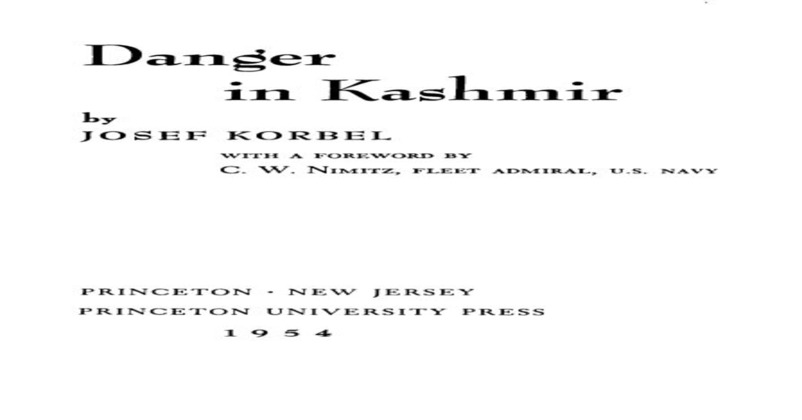Unlike 1948 UN must not betray India this time and its condemnation must follow with action
| 23-Feb-2019 |
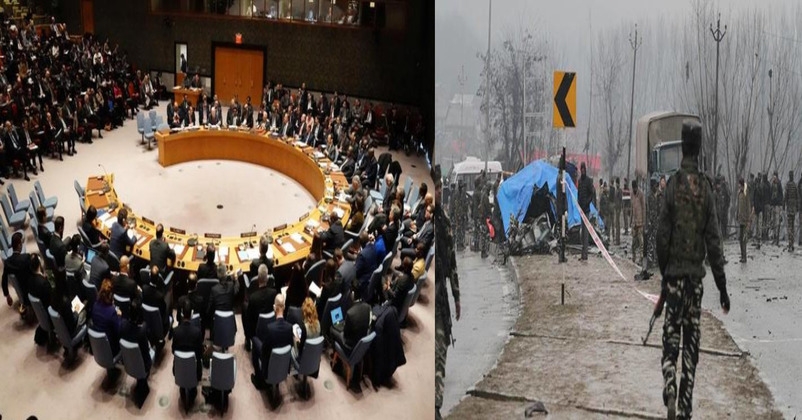
The United Nations Security Council (UNSC) condemned the February 14 suicide attack in Pulwama on the convoy of CRPF soldiers, in which more than 40 of them martyred. UNSC called this attack “heinous and cowardly” and advocated for holding perpetrators of these “reprehensible acts of terrorism accountable and bring them to justice”.
The UNSC mentioned in a statement “The members of the Security Council condemned in the strongest terms the heinous and cowardly suicide bombing in Jammu and Kashmir, which left 40 Indian paramilitary forces dead and dozens wounded on February 14, 2019, for which Jaish-e-Mohammed has claimed responsibility,”. The UN organ, which includes five permanent members China, France, Russia, UK, and the US “underlined the need to hold perpetrators, organisers, financiers and sponsors of these reprehensible acts of terrorism accountable and bring them to justice”. It adds, “The members of the Security Council reaffirmed that terrorism in all its forms and manifestations constitutes one of the most serious threats to international peace and security”.
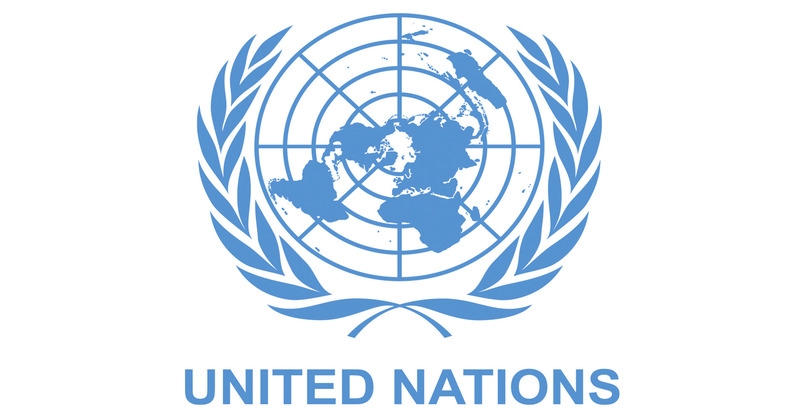
The UNSC asserted the “need for all States to combat by all means, in accordance with the Charter of the United Nations and other obligations under international law, threats to international peace and security caused by terrorist acts”. Though Pakistan’s support to terrorists is not a new thing but the present condemnation of UNSC revived hope that the international body would walk the talk. It is expected that the United Nations (UN) would take decisive action against terrorists and its patron country. It is also hoped that the United Nations UN will not betray India like it did after 1948 on the issue related to Jammu and Kashmir.
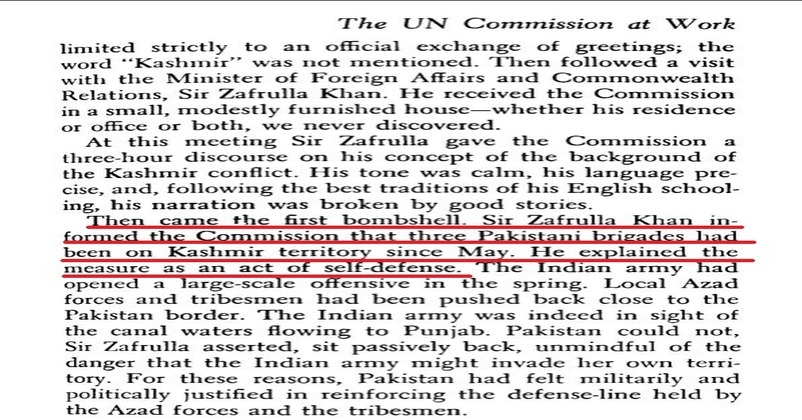
Excerpts from the book ‘Danger in Kashmir’
Pakistan’s confession on aggression and invasion on Indian Territory in 1948
Terrorism is showing its most virulent form this time and the international community must act on it otherwise the survival of entire mankind would jeopardize. The international peacekeeping agencies are essentially expected to do justice and the same is expected from the UNSC. It is also expected that unlike it betrayed India and sided with the aggressor, this time the situation would be different. Even the whole issue in Jammu and Kashmir would have been solved, if the international community would have acted impartially and on what the United Nations Commission for India and Pakistan (UNCIP) has found in 1948. The fact-finding team found that Pakistan invaded Jammu and Kashmir. Josef Korbel, a member of UNCIP, in his book ‘Danger in Kashmir’ found that Pakistan invaded on the foreign land in 1948 and that foreign land was the territory of India. Korbel mentioned in this book “Sir Zafrulla Khan informed the Commission that three Pakistani brigades had been on Kashmir territory since May. He explained the measure as an act of self-defense. ……….. Local Azad forces and tribesmen had been pushed back close to the Pakistan border………. Pakistan could not, Sir Zafrulla asserted, sit passively back, unmindful of the danger that the Indian army might invade her own territory. For these reasons, Pakistan had felt militarily and politically justified in reinforcing the defense-line held by the Azad forces and the tribesmen.” This statement of the then Pakistan Foreign Minister clearly established that Pakistan recognized Jammu and Kashmir as Indian Territory and it invaded on it. Importantly, this confession was not done under coercion that the prisoners make but a free country and a powerful man did it.
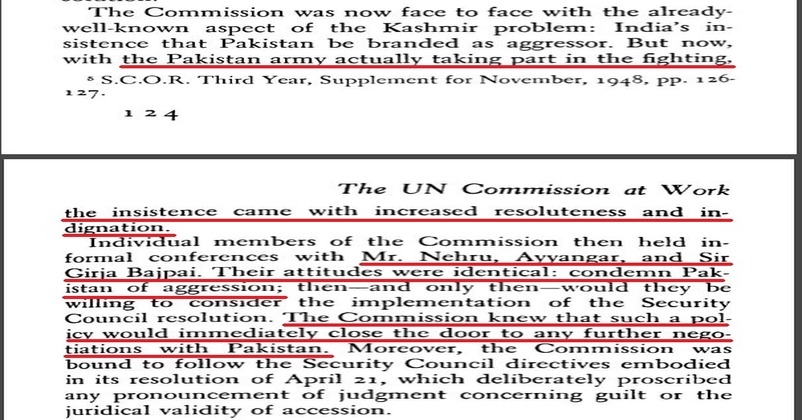
Excerpts from the book ‘Danger in Kashmir’
India’s indignation and United Nations willful ignorance to aggravated problem in J&K
India just wanted UNCIP to declare what it has found but these considerations were never paid heed. Pakistan was fighting in Indian land and that has been established but UNCIP could not show the courage to act. Korbel said, “But now, with the Pakistan army actually taking part in the fighting the insistence came with increased resoluteness and indignation”. This statement of Korbel in his book clearly established why India was not happy about the way the whole issue in Jammu and Kashmir was dealt with. He added “Individual members of the Commission then held informal conferences with Mr. Nehru, Ayyangar, and Sir Girja Baipai. Their attitudes were identical: condemn Pakistan of aggression; then and only then would they be willing to consider the implementation of the Security Council resolution”. Confession of Pakistan mentioned by Korbel “We also knew that when the case was before the Security Council, India had insisted upon cessation of hostilities as a first step”. It is a decisive statement made Korbel about India and it was essential that the United Nations must have dealt the situation impartially and based on the facts that were found by its own organ.
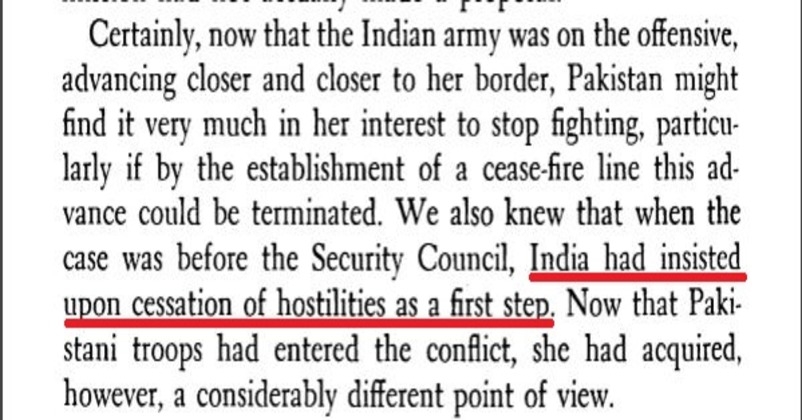
Excerpts from the book ‘Danger in Kashmir’
India moved a complaint, in UN, against Pakistan, in 1948, for invading on Indian Territory and Pakistan must have been declared aggressor. Further, the aggression of Pakistan was found by UNCIP. Later in 1957, the V.K. Krishna Menon, the representative of India in UN, reiterated the same and reminded the international community about the real issue yet the correct action was never taken by the UN. But the past mistakes could be corrected and UNSC must take decisive and correct steps that are based on facts instead of concocted stories. It must ask Pakistan to clear its soil of terrorists and the land it has kept on occupying illegally. This decisive action would help in breaking the backbone of terrorism or else the situation that India is facing today would spiral like fire and become a threat to world peace and tranquility.
